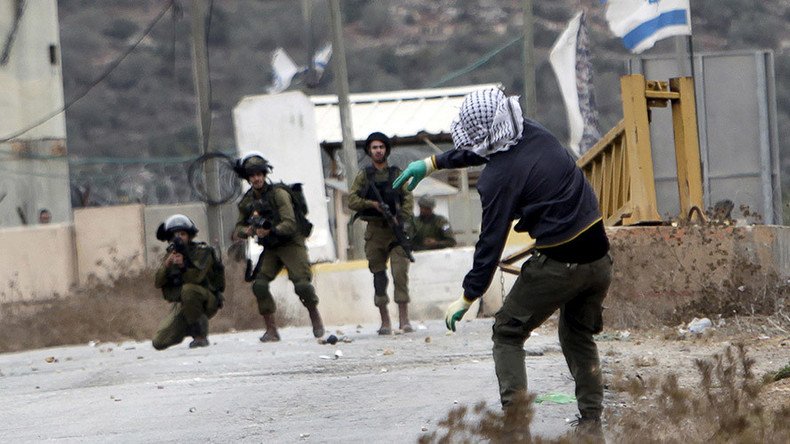Israel bans Arab-Jewish romantic novel from curriculum as it shows IDF as ‘sadistic war criminals'

Israel's Education Ministry has decided to ban high schools from teaching students an award-winning novel depicting a love story between an Israeli woman and a Palestinian man on the grounds that it could encourage intermarriage.
“Officials discussed the matter of including the book in the curriculum,” the ministry said in a statement. “After it seriously examined all the considerations, and weighed the advantages and drawbacks, they decided not to include the book in the curriculum.”
"Gader Haya" ("Borderlife") by Dorit Rabinyan won Israel's coveted Bernstein literary prize in 2015. The novel revolves around Liat, an Israeli translator, and Khilmi, a Palestinian painter. They fall in love in New York, but things take a dramatic turn when the two return to their families and homes in Tel Aviv and Ramallah, respectively.
The book was recommended to be added to the school curriculum by a panel of educators and academics, but deemed a threat by senior Education Ministry officials.
"Intimate relations, and certainly the available option of institutionalizing them by marriage and starting a family - even if that does not happen in the story - between Jews and non-Jews, are seen by large portions of society as a threat on the separate identities [of Arabs and Jews]," Dalia Fenig, acting Pedagogic Secretariat, said, according to the Ynetnews website.
Arrests, assaults, death threats: UN slams treatment of human rights defenders in Palestine https://t.co/nxthIDkANcpic.twitter.com/N7U8VOP7Ro
— RT (@RT_com) 20 декабря 2015Education Minister Naftali Bennett threw his weight behind the ministry's decision to ban the book from the national curriculum, telling Channel 2 TV that exposing high school students to a book which "depicts IDF soldiers as sadistic war criminals" was not a national priority, Haaretz reported.
"This has nothing to do with censorship,” Bennett insisted, claiming that he personally wasn't involved in the decision to ban the book, and adding that whoever wants to read "Borderlife" is welcome to buy it.
The minister said, however, that he wouldn't "force" Israeli children to read a book in which "soldiers are equated with Hamas terrorists and which describes an affair between a Palestinian security detainee and an Israeli woman."
Dorit Rabinyan, a 44-year-old Israeli author with Persian roots, said the minister's comments were “unbefitting.”
"Mr. Bennett did not read 'Borderlife,'” Haaretz reported her as saying. “His mendacious rhetoric in which he cherry-picked quotes, taking them out of context, is unbefitting an education minister in Israel and is infinitely more severe than the initial disqualification."
The acclaimed novelist added: "Those who have read the book will attest that it is rife with patriotism and concern for [Israel's] future more than anything else."
Exposing explosive devices? Israel ‘destroys Palestinian crops’ along security fence https://t.co/dAjHmGvp8Fpic.twitter.com/pdFRUa1src
— RT (@RT_com) December 31, 2015High school principals and teachers staged protests against the ministry's ban. Many schools said they plan to hold special classes devoted to studying the novel and buy copies of the book for their school libraries.
After the ban caused a public uproar, the ministry announced that "Borderlife" can be studied in advanced literature studies classes “in the context of alternative appraisals," but not as part of the regular school curriculum.
According to Racheli Edelman, the chairwoman of the Book Publishers Association of Israel, “Borderlife” is a “topical book that depicts the problematic nature of our life in this country, the problematic nature of relations between Jews and Arabs. Yet at the same time, it shows the Arab as someone it’s possible to love.”
Edelman wrote in Haaretz that in today's Israel, even the Bible would have failed to pass the government censor, along with Shakespeare’s plays, Tolstoy’s “Anna Karenina” and “War and Peace” and Dostoevsky’s “Crime and Punishment,” just to name a few.
Violence has been on the rise in recent months in Jerusalem and other cities amid tensions surrounding a shared holy site known as Al-Aqsa mosque to Muslims and Temple Mount to Jews.
‘Disproportionate use’: 3,500 admin detainees in past decade not convicted - Knesset study https://t.co/81JvFuJlxYpic.twitter.com/5K8B9x6miy
— RT (@RT_com) December 23, 2015Eighteen Israelis have been killed, mostly in stabbings, since mid-September, and 88 Palestinians reportedly killed by Israeli fire (of those 56 were attackers, according to Israel), and the rest were killed in clashes with Israeli security forces.
In December, United Nations experts called for an end to the harassment of human rights defenders in the Occupied Palestinian Territories, calling the Israeli attacks “unacceptable.”
In July 2014, in retaliation against Hamas rockets, Israel launched a military offensive in the Gaza Strip, dubbed “Operation Protective Edge.” It claimed the lives of some 2,251 Palestinians, mostly civilians, and 72 Israelis, according to the UN.












